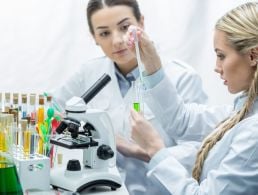Want to jump on the biotech bandwagon? Stay one step ahead by getting to know the most in-demand jobs in the sector with help from Hays’ Paul Strouts.
If you’re angling for a career in the biotechnology sector, whether following on from university or transitioning from an existing position in life sciences, your prospects are excellent.
Data from the US Bureau of Labor Statistics (BLS) Occupational Outlook Handbook, which highlights employment projections for the 10 years from 2014 to 2024, covers a range of jobs most likely to be in demand during this period.
While the handbook is specific to the US market, we see similar trends in the United Kingdom and elsewhere around the world.
Budding jobseekers would do well to consider the following roles described in the report, and to tailor their experience, professional development and credentials accordingly.
Genetic counsellors
With so much going on in the genetics space, it comes as no surprise that the BLS anticipates demand for genetic counsellors to increase by almost 30pc between 2014 and 2024.
Genetic counsellors evaluate DNA test results to assess the risk of acquiring inherited medical conditions, and follow up with counselling.
Most work in hospitals, but some work in community roles in association with medical practices.
Biomedical engineers
The combination of biological science and engineering is a powerful one as it precedes the design of instruments, devices and software for healthcare applications that are revolutionising the field of medicine.
Many of these roles arise in medical-equipment manufacturing, and life sciences research and development (R&D).
The BLS expects positions in this area to increase by 23pc to 2024, delivering up many new employment opportunities for candidates who decide to focus in this direction.
Laboratory scientists and technicians
As the diagnostics sector continues to expand, the roles responsible for performing the tests and procedures ordered by primary and secondary healthcare professionals are expected to grow as well.
The BLS projects an increase of 16pc in laboratory positions associated with clinical diagnostics, which is excellent news for life sciences graduates with an interest in, and aptitude for, the clinical laboratory environment.
Biophysicists and biochemists
Scientists at the doctoral level who study the biological, chemical and physical processes of life, work mainly in R&D for universities and colleges, and for pharmaceutical and medical manufacturers.
These positions are expected to increase in number, with the BLS anticipating an uptick of 8pc in the coming years.
Epidemiologists
Despite dramatic expansion in our scientific knowledge base, the exact causes of many diseases in human populations remain elusive.
Epidemiologists, who study patterns of disease at the ‘macro’ level, can therefore expect to remain busy, with a 6pc increase in the number of jobs anticipated.
Microbiologists
Bacterial, viral and parasitic micro-organisms are increasingly under the microscope in a world in which antibiotic resistance threatens the established order in the medical treatment paradigm.
The BLS expects the demand for microbiologists to increase by 4pc between 2014 and 2024.
All these positions require a minimum life sciences bachelor’s degree, combined with a shedload of curiosity and passion.
One way to navigate a brilliant career in biotechnology is to get along to one or more of the many international congresses and speaker events in this area, and network.
Another is to contact a recruitment agency, which can give you an expert opinion on potential opportunities and career strategies, and may even be able to match you with a suitable employer.
By Paul Strouts
Paul Strouts is the global managing director for Hays Life Sciences. Strouts looks after 27 countries within the group’s portfolio, spanning from New York in the US to Sydney in Australia.




